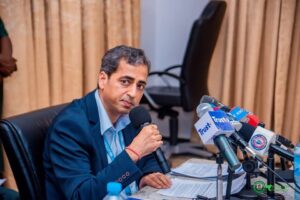
Dutse, Feb.20, 2025
United Nations Children’s Fund (UNICEF), has said that it will continue to support Jigawa state in building local resilient health systems.
Dr. Shyam Sharan Pathak, Chief of Health, UNICEF Nigeria, stated this on Thursday, at the official handover ceremony of the GAVI,PHC-MoU three years project to Jigawa State Government in Dutse.
UNICEF he said, will continue to support the state to scale up essential services from Primary Health care centers, including routine immunization services.
The significant milestones achieved through the programme, according to Pathak, is testament of a solid partnership and commitment for every child, youth and mother in Jigawa state and across the country.
According to him, “I appreciate the contribution of N879,250,000 million Naira, as co-financing for the MoU program by the Jigawa state government, with resultant 15.6% of state budget allocated to health.
“UNICEF appreciates GAVI, the vaccine alliance, for their support to scale up PHC services, to improve routine immunization coverage and deliver quality essential health services,” The Chief said.
On behalf of UNICEF, he advocated for more investment, oversight, to improve and sustain current results, retain health workers and maintain equipment.
He further advocated for the sustainability of mechanisms and operations of outreach services and strengthened documentation and data for decision making.
Responding, the Jigawa state Gov. Umar Namadi, commended UNICEF and partners, for their support to the health sector in Jigawa state during the past years of the project.
Represented by his Deputy, Mr Aminu Usman, Namadi highlighted that since inception, the administration embarked on massive revitalization of the Primary Health sector in the state.
He explained that the major achievement recorded through the partnership, is the funding of special health insurance cover for 143,500 beneficiaries in the 27 local governments.
“This is in line with our 12-Point Agenda and we accorded the health sector a priority with massive transformation of the Primary Healthcare at the grassroots, in order to fulfill our promises,” he said.
The administration according to Namadi, will continue to initiate health related policies and proragams, to boost the health systems in the state.
Also, the State Commissioner for Health, Dr Muhammed Kainuwa, highlighted the major achievements recorded under the three years GAVI/State-funded Support.
He said that about 416,250(70%) adolescent girls protected against Human Papilloma Virus (HPV) through HPV vaccine.
Kainuwa revealed that there has been an improved storage capacity for vaccines, through procurement and installation of a walking cold room, freezers and Solar Direct Drive refrigerators.
“There was also logistics support for vaccine distribution with three vehicles as well as the recruitment of 330 personnel, who were absorbed into the government workforce,” he stressed.
The Commissioner further commended traditional rulers in the state, for their support in creating awareness and mobilization throughout the three years partnership.
Dr Kabiru Ibrahim, The state’s Permanent Secretary, Ministry of health while commenting on the journey, commended Namadi for resilience.
He said that the administration’s commitment to strictly adhere to the guidelines and policies of the Federal Ministry of Health is commendable.
Also, Dr Shehu Sambo, Executive Director, Jigawa State Primary Healthcare Development Agency, said the MoU has attracted new health related legislations in the state.
“It has instilled coordination of all stakeholders, improved quality interventions human resources management and also attracted more funding for primary health services.
The Primary Health Care MoU Health Systems Strengthening initiative is a three-year (2022 – March 2025) partnership programme between GAVI and Eight States in Nigeria amongst which is Jigawa state.
It aimed to strengthen routine immunization and Primary Health Care systems, towards the reduction of morbidity and mortality, by addressing vaccine preventable deaths and other essential services.
By Aisha Ahmed
